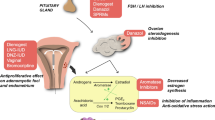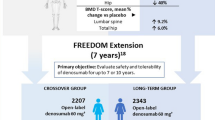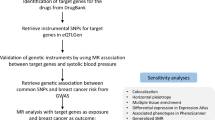ABSTRACT
Purpose
The cardiovascular effects of estrogen deprivation induced by aromatase inhibitors are unknown. We carried out a cross-sectional study to evaluate the effect of estrogen deprivation induced by aromatase inhibitors on markers of cardiovascular risk.
Methods
We enrolled 410 postmenopausal women: 200 consecutive breast cancer patients treated with aromatase inhibitors for a median of 53 months (range 23–122) and 210 volunteer controls. Carotid intima-media thickness, presence of carotid stenosis, and presence of abdominal aortic aneurism were evaluated through an ultrasound examination.
Results
Average carotid intima-media thickness was 0.97 ± 0.02 mm and 1.08 ± 0.02 mm for breast cancer group and control group, respectively (p < 0.005). The incidence of carotid stenosis in the two groups was similar: 24.2 % in the breast cancer group and 28.6 % in the control group (OR 0.80; 95 % CI 0.51–1.25; p = 0.32). No aneurismatic dilatation of the aorta was recorded. Average abdominal aortic diameter was 14.9 ± 2.4 mm in the breast cancer group and 15.0 ± 2.4 mm in the control group.
Conclusions
Our study showed no association between treatment with aromatase inhibitors for five or less years and increased carotid intima-media thickness and higher prevalence of carotid stenosis or abdominal aortic aneurism. The lack of impact on these markers suggests that cardiovascular risk is not increased by treatment with aromatase inhibitors.
Similar content being viewed by others
References
European Heart Network (2012) European cardiovascular disease statistics. www.escardio.org
Xu J, Murphy SL, Kochanek KD, Bastian BA (2016) Deaths: final data for 2013. Natl Vital Stat Rep 64:1–119
Barrett-Connor E (1997) Sex differences in coronary heart disease. Why are women so superior? The 1995 Ancel keys lecture. Circulation 95:252–264
Saltiki K, Alevizaki M (2007) Coronary heart disease in postmenopausal women; the role of endogenous estrogens and their receptors. Horm Athens Greece 6:9–24
Lederle FA, Johnson GR, Wilson SE, Aneurysm detection and management veterans affairs cooperative study (2001) Abdominal aortic aneurysm in women. J Vasc Surg 34:122–126. doi:10.1067/mva.2001.115275
Mendelsohn ME, Karas RH (1999) The protective effects of estrogen on the cardiovascular system. N Engl J Med 340:1801–1811. doi:10.1056/NEJM199906103402306
Mendelsohn ME (2002) Genomic and nongenomic effects of estrogen in the vasculature. Am J Cardiol 90:3F–6F
Case J, Davison CA (1999) Estrogen alters relative contributions of nitric oxide and cyclooxygenase products to endothelium-dependent vasodilation. J Pharmacol Exp Ther 291:524–530
Prentice RL (2014) Postmenopausal hormone therapy and the risks of coronary heart disease, breast cancer, and stroke. Semin Reprod Med 32:419–425. doi:10.1055/s-0034-1384624
Senkus E, Kyriakides S, Penault-Llorca F et al (2013) Primary breast cancer: ESMO clinical practice guidelines for diagnosis, treatment and follow-up. Ann Oncol 24(Suppl 6):7–23. doi:10.1093/annonc/mdt284
Coates AS, Winer EP, Goldhirsch A et al (2015) Tailoring therapies-improving the management of early breast cancer: St Gallen International Expert Consensus on the Primary Therapy of Early Breast Cancer 2015. Ann Oncol 26:1533–1546. doi:10.1093/annonc/mdv221
Burstein HJ, Temin S, Anderson H et al (2014) Adjuvant endocrine therapy for women with hormone receptor-positive breast cancer: american society of clinical oncology clinical practice guideline focused update. J Clin Oncol 32:2255–2269. doi:10.1200/JCO.2013.54.2258
Geisler J, Haynes B, Anker G et al (2002) Influence of letrozole and anastrozole on total body aromatization and plasma estrogen levels in postmenopausal breast cancer patients evaluated in a randomized, cross-over study. J Clin Oncol 20:751–757
Geisler J, King N, Anker G et al (1998) In vivo inhibition of aromatization by exemestane, a novel irreversible aromatase inhibitor, in postmenopausal breast cancer patients. Clin Cancer Res 4:2089–2093
Lim Y-P, Lin C-L, Lin Y-N et al (2015) Tamoxifen treatment and the reduced risk of hyperlipidemia in Asian patients with breast cancer: a population-based cohort study. Clin Breast Cancer. doi:10.1016/j.clbc.2015.03.005
Herrington DM, Klein KP (2001) Effects of SERMs on important indicators of cardiovascular health: lipoproteins, hemostatic factors, and endothelial function. Womens Health Issues 11:95–102
Howell A, Cuzick J, Baum M et al (2005) Results of the ATAC (arimidex, tamoxifen, alone or in combination) trial after completion of 5 years’ adjuvant treatment for breast cancer. Lancet Lond Engl 365:60–62. doi:10.1016/S0140-6736(04)17666-6
van de Velde CJH, Rea D, Seynaeve C et al (2011) Adjuvant tamoxifen and exemestane in early breast cancer (TEAM): a randomised phase 3 trial. Lancet Lond Engl 377:321–331. doi:10.1016/S0140-6736(10)62312-4
Jakesz R, Jonat W, Gnant M et al (2005) Switching of postmenopausal women with endocrine-responsive early breast cancer to anastrozole after 2 years’ adjuvant tamoxifen: combined results of ABCSG trial 8 and ARNO 95 trial. Lancet Lond Engl 366:455–462. doi:10.1016/S0140-6736(05)67059-6
Coates AS, Keshaviah A, Thürlimann B et al (2007) Five years of letrozole compared with tamoxifen as initial adjuvant therapy for postmenopausal women with endocrine-responsive early breast cancer: update of study BIG 1–98. J Clin Oncol 25:486–492. doi:10.1200/JCO.2006.08.8617
Venturini M, Del Mastro L (2006) Safety of adjuvant aromatase inhibitor therapy. Cancer Treat Rev 32:548–556. doi:10.1016/j.ctrv.2006.07.012
Early breast cancer trialists’ collaborative group (EBCTCG) (2015) Aromatase inhibitors versus tamoxifen in early breast cancer: patient-level meta-analysis of the randomised trials. Lancet Lond Engl. doi:10.1016/S0140-6736(15)61074-1
Steinvil A, Sadeh B, Arbel Y et al (2011) Prevalence and predictors of concomitant carotid and coronary artery atherosclerotic disease. J Am Coll Cardiol 57:779–783. doi:10.1016/j.jacc.2010.09.047
Pickett CA, Jackson JL, Hemann BA, Atwood JE (2008) Carotid bruits as a prognostic indicator of cardiovascular death and myocardial infarction: a meta-analysis. Lancet Lond Engl 371:1587–1594. doi:10.1016/S0140-6736(08)60691-1
Chambless LE, Heiss G, Folsom AR et al (1997) Association of coronary heart disease incidence with carotid arterial wall thickness and major risk factors: the atherosclerosis risk in communities (ARIC) study, 1987–1993. Am J Epidemiol 146:483–494
Durieux R, Van Damme H, Labropoulos N et al (2014) High prevalence of abdominal aortic aneurysm in patients with three-vessel coronary artery disease. Eur J Vasc Endovasc Surg 47:273–278. doi:10.1016/j.ejvs.2013.12.011
Polak JF, Szklo M, O’Leary DH (2015) Associations of coronary heart disease with common carotid artery near and far wall intima-media thickness: the multi-ethnic study of atherosclerosis. J Am Soc Echocardiogr. doi:10.1016/j.echo.2015.04.001
Johnston KW, Rutherford RB, Tilson MD et al (1991) Suggested standards for reporting on arterial aneurysms. subcommittee on reporting standards for arterial aneurysms, ad hoc committee on reporting standards, society for vascular surgery and North American chapter, international society for cardiovascular surgery. J Vasc Surg 13:452–458
de Weerd M, Greving JP, Hedblad B et al (2010) Prevalence of asymptomatic carotid artery stenosis in the general population: an individual participant data meta-analysis. Stroke J Cereb Circ 41:1294–1297. doi:10.1161/STROKEAHA.110.581058
Derubertis BG, Trocciola SM, Ryer EJ et al (2007) Abdominal aortic aneurysm in women: prevalence, risk factors, and implications for screening. J Vasc Surg 46:630–635. doi:10.1016/j.jvs.2007.06.024
Haque R, Shi J, Schottinger JE et al (2016) Cardiovascular disease after aromatase inhibitor use. JAMA Oncol. doi:10.1001/jamaoncol.2016.0429
Goss PE, Ingle JN, Martino S et al (2005) Randomized trial of letrozole following tamoxifen as extended adjuvant therapy in receptor-positive breast cancer: updated findings from NCIC CTG MA.17. J Natl Cancer Inst 97:1262–1271. doi:10.1093/jnci/dji250
Rosell J, Nordenskjöld B, Bengtsson N-O et al (2013) Effects of adjuvant tamoxifen therapy on cardiac disease: results from a randomized trial with long-term follow-up. Breast Cancer Res Treat 138:467–473. doi:10.1007/s10549-013-2457-6
Braithwaite RS, Chlebowski RT, Lau J et al (2003) Meta-analysis of vascular and neoplastic events associated with tamoxifen. J Gen Intern Med 18:937–947
Gallicchio L, Calhoun C, Helzlsouer K (2016) Effect of aromatase inhibitor therapy on the cardiovascular health of black and white breast cancer patients. Clin Breast Cancer. doi:10.1016/j.clbc.2016.02.011
Chapman J-AW, Shepherd LE, Ingle JN et al (2016) Competing risks of death in women treated with adjuvant aromatase inhibitors for early breast cancer on NCIC CTG MA.27. Breast Cancer Res Treat 156:343–349. doi:10.1007/s10549-016-3761-8
Acknowledgments
We thank all the women who participated into the study. We also thank Simona Pastorino (Department of Medical Oncology, U.O. Oncologia Medica 2, IRCCS AOU San Martino—IST, Istituto Nazionale per la Ricerca sul Cancro, Genova, Italy) for administrative support.
Author Contribution
Conception and design: L. Del Mastro, D. Palombo, and P. Bruzzi. Administrative support: S. Pastorino. Provision of study materials or patients: E. Blondeaux, D. Musio, M. Lambertini, V. Gazzola, F. Poggio, S. Vecchio, A. Levaggi, A. D’Alonzo, M.C. Perfumo, C. Bighin, and S. Giraudi. Collection and assembly of data: E. Blondeaux, D. Musio, M. Lambertini, V. Gazzola, F. Poggio, S. Vecchio, A. Levaggi, A. D’Alonzo, M.C. Perfumo, C. Bighin, and S. Giraudi. Data analysis and interpretation: E. Blondeaux, L. Del Mastro, P. Bruzzi. L. Del Mastro, and P. Bruzzi, who had full access to all the data in the study and take responsibility for the integrity of the data and the accuracy of the data analysis. Manuscript writing: E. Blondeaux, L. Del Mastro, P. Bruzzi, and M. Lambertini. Final approval of the manuscript: all the authors.
Author information
Authors and Affiliations
Corresponding author
Ethics declarations
Conflict of interest
The authors declare that they have no conflict of interest.
Ethical approval
The study complies with the current laws of the country in which it was performed. All procedures performed in studies involving human participants were in accordance with the ethical standards of the institutional and/or national research committee and with the 1964 Helsinki declaration and its later amendments or comparable ethical standards.
Rights and permissions
About this article
Cite this article
Blondeaux, E., Musio, D., Bruzzi, P. et al. Treatment with aromatase inhibitors and markers of cardiovascular disease. Breast Cancer Res Treat 160, 261–267 (2016). https://doi.org/10.1007/s10549-016-3985-7
Received:
Accepted:
Published:
Issue Date:
DOI: https://doi.org/10.1007/s10549-016-3985-7




